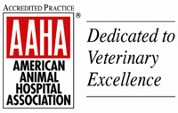This holiday season, perhaps more than ever, we cherish spending meaningful time with family, including our pets. At Old Towne Animal Hospital, we want to help you keep the holidays happy. While you’re enjoying the festivities, here are some potential pet hazards to keep in mind so you can help keep the holidays safe for your furry family members.
Human Foods
You may be tempted to share your holiday fare with your pet, but some of the food we consume is dangerous—and can sometimes be deadly—for dogs and cats. Avoid feeding your pet any of these items:
- Alcoholic beverages—Alcohol affects pets very quickly and can cause serious medical issues, like drops in body temperature, seizures, and even respiratory failure and death.
- Anything with xylitol—Baked goods, peanut and other nut butters, sugar-free candies or mints, and even gum may all contain this sugar substitute. Xylitol in even small amounts can cause vomiting, weakness, a decrease in blood sugar (hypoglycemia), and seizures or liver failure.
- Bones—Raw or cooked, bones just aren’t worth letting pets chew on. They can break teeth, cut a pet’s mouth and tongue, get stuck in the throat, and even pierce the esophagus or intestines, which can be life-threatening.
- Chocolate—The darker the chocolate, the more danger it poses, but chocolate in any form can make dogs or cats quite ill.
- Fatty or salty foods—Bacon, bacon grease, ham, turkey skin, and fat trimmed off meat or bones contains a lot of salt and fat and can cause indigestion, vomiting, and diarrhea in both dogs and cats. These foods can also cause pancreatitis, a serious, potentially deadly inflammation of the pancreas.
- Grapes and raisins—For some pets, consuming just a few grapes or raisins may be very serious, potentially causing kidney failure or death if not treated quickly.
- Macadamia nuts—It only takes a few of these nuts that are popular around the holidays to make a dog very sick.
- Onions and garlic—Any form of onions or garlic (or their relatives chives, scallions, shallots, and leeks) can destroy red blood cells, causing anemia in both dogs and cats.
- Raw dough—The yeast in unbaked dough will continue to rise inside a pet’s stomach and can lead to bloat, a life-threatening condition in which the stomach twists over on itself. Raw dough can also cause alcohol poisoning.
- Turkey, chicken, or other meat that’s been seasoned—Most turkey and chicken cooked around the holidays has been brined and/or contains butter and seasoning, all of which can cause digestive problems and even pancreatitis in cats and dogs.
If you think your pet has consumed something toxic, call us immediately at 916-961-8683. After hours and over holidays, you can call the ASPCA Animal Poison Control Center at 888-426-4435 or Pet Poison Helpline at 855-764-7661 (a fee will be charged).
Remember that even the most normally well-behaved dogs and cats may not wait for an invitation to snatch up a tasty-looking treat from a countertop or off a guest’s plate during holiday gatherings. Help keep your pet safe by:
- Warning guests to keep their plates out of your pet’s reach.
- Covering snacks and other food if it’s sitting out.
- Covering or putting away food right after a meal to prevent your pet from getting into leftovers or table scraps.
Ask us for tips on what people foods ARE safe for your pet to have as an occasional treat. We want to make sure your pet stays safe and gets to enjoy the holiday season too!
Holiday Plants
Although plants play a big part in the holiday season, some festive flowers and greenery may be better left out of your holiday decorating—or at least far out of your pet’s reach. The following plants are toxic to both dogs and cats:
- Amaryllis bulbs (the flowers and leaves are less toxic)
- Holly berries and leaves
- Lilies
- Nandina berries (also called heavenly or sacred bamboo)
- Oleander (including water in the vase)
Despite common perception, some holiday plants tend to be less of a concern:
- Mistletoe (however, ingesting large amounts can cause serious problems in pets, including death)
- Poinsettias (the sap can cause drooling, diarrhea, and vomiting, but these flowers generally don’t pose a more serious danger to pets)
- Christmas cactus (generally doesn’t cause more than mild digestive issues)
Although some holiday plants may not pose as much of a risk as others, it’s always a good idea to restrict your pet’s access to plants.
Other Decorations
Unfortunately, a number of common holiday decorations can also put pets at risk:
- Christmas trees should be secured to prevent pets from knocking them over during play or if they try to jump or climb on the branches.
- Needles from trees, wreaths, and other greenery can irritate pets’ mouths and stomachs and can potentially puncture the intestines or cause a blockage.
- Water in tree stands can be toxic to pets, especially if it contains additives or preservatives.
- Electric lights can burn or electrocute pets if they chew the cord. Consider hiding or pet-proofing cords, especially if your pet likes chewing them.
- Ornaments can cause problems if they break or are swallowed. If you display breakable ornaments, keep them toward the top of the tree (which may not stop a determined cat) or in an area your pet can’t access.
- Long, thin objects like tinsel, ribbon, yarn, and even the twine used to truss a turkey for a holiday feast can pose serious, potentially life-threatening issues if a dog or cat swallows them.
- Candles and liquid potpourri can cause burns or worse if they get knocked over by an excited pet’s tail. They’re also usually toxic if ingested. Keep these sweet-smelling items out of reach of your pet, unplug them when you leave the house, and consider limiting their use or using electric candles instead.
Be especially careful and attentive with holiday decorations if you have a puppy or kitten in the house and you don’t yet know what your new pet is most curious about or likes to chew on.
Keeping Your Holidays Safe
If your pet eats anything mentioned above or gets into anything else you’re not sure is safe for your pet to consume, call us at 916-961-8683 or the ASPCA Animal Poison Control Center or Pet Poison Helpline right away. Don’t wait for your pet to develop symptoms, and don’t induce vomiting, unless your Old Towne veterinarian or a pet poison control expert recommends it.



